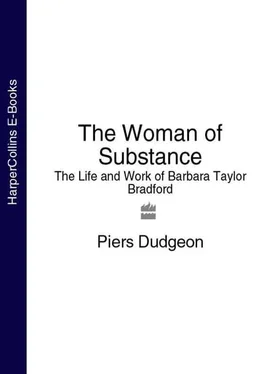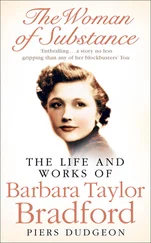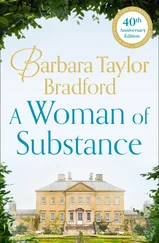‘I also liked my grandmother, Esther Taylor. Her maiden name was Spence. She was very sweet and not quite Alfred Crowther’s wife in Act of Will . Eliza Crowther is always the voice of doom, saying, “Happiness, that’s for them that can afford it.” My real grandmother was full of other sayings like, “A stitch in time saves nine”, “You’d better watch your p’s and q’s”, though I do remember her baking like Mrs Crowther – bacon-and-egg pies (we’d call them quiche Lorraine today), also apple pie, and sheep’shead broth and lamb stews. On Saturday morning I used to go for her to the Co-op, but we didn’t call it the Co-op, it was called the Cworp – Armley dialect, I suppose. You could buy everything at the Cworp. It had a meat department, vegetables, groceries, cleaning products . . . She loved me. I think I was her favourite.’
All was as Barbara remembered of her grandparents’ houses, and she went on to tell me about the rest of the Taylor brood. ‘Winston had a sister called Laura, who lived in Farsley, was married and had a child. She was my favourite aunt. She died of lung cancer during the war, when I was about seven; she died at home and it was a horrible death. I remember going to see her. She was a very heavy smoker. After Laura died, her husband went to live with his family with their little boy, but died not long after. Laura Spencer in A Woman of Substance was based on my Aunt Laura, except our family were not Catholic. She was sweet and gentle and so good.
‘Then there was Olive, married to Harry Ogle. He had a motorbike and sidecar. He was in the RAF during the war. They never had children. And Aunt Margery, always called Madge . . . she was beautiful.’
Aunt Margery, I was to learn, had the ‘uncommon widow’s peak above the proud brow’ that was Emma Harte’s and granddaughter Paula’s in A Woman of Substance , and Vincent’s in Act of Will . It did not belong to Barbara, as I had imagined.
‘Madge lived in Lower Wortley. She was married, but didn’t have children either. I remember I was her bridesmaid when I was six. Olive was another favourite aunt. Everybody loved Olive. She managed a confectioner’s shop, Jowett’s at Hyde Park Corner – in Leeds, not London! – and I used to go and see her there. She used to let me serve a customer now and then. She lived in this house at twenty-one Cecil Grove, just the other side of the Stanningley Road, by Armley Park.
‘We would go on picnics together. She always took her knitting. On one occasion, so the story goes, I nearly drowned. Olive suddenly looked up and said to Uncle Harry, “Where’s Barbara?” They couldn’t see me. Then, far out in the river, they saw my dress caught on a dead branch, they saw me actually bob up and go under the water again and I was flailing around because I couldn’t swim. But the branch had hooked into my dress and was holding me up. Today I have a terrible fear of the sea where I can’t put my feet on the bottom. I panic, which I think must go back to that. They got me out in the end, soaked and crying, and dried the dress in the sun, but you know the English sun! They took me home to their house and Auntie Olive ironed the dress and got me back home looking like the starched child that I was.
‘So, Daddy had three sisters, and they spoiled me to death, of course, because two of them didn’t have children. Their brothers were Winston – my father – Jack, Bill, and Don, the youngest, who sadly died just recently. He and his wife, Jean, my one surviving aunt, had a daughter, Vivienne, my only cousin.
‘Jack and Bill Taylor lived at home with my grandmother and never married. I didn’t know them very well. Jack was in the army during the war, I think, and Bill was in minesweepers off the coast of Russia and places like that. Afterwards they came home and lived with my grandma, and then when she died they continued to live in that house – two bachelors, very straight, but very dour . I used to go and see my grandmother, and they would be sitting in their chairs and nobody spoke. I hated it. I wasn’t scared of them, I paid not a blind bit of notice because my focus was somewhere else.
Barbara says she owes her good looks to her father, and that ‘he was very good-looking, dark-haired, green-eyed. My father in particular was always very well dressed and very well groomed, and even today I can’t stand ungroomed men. Any man that I ever went out with before I knew my husband was always good-looking, always well dressed and well groomed. I loved my father. He would have charmed you.’ In Act of Will , Vincent, Winston’s fictional persona, boasts an almost feminine beauty, though ‘there never was any question about his virility’. Barbara describes him in fact and fiction as a natural star, charismatic, one who drew others (especially women) to him by force of personality, dashing looks and more than his fair share of beguiling charm . . . plus he had ‘the gift of the gab’.
Family legend boosted his reputation further with the adventurous story that at fourteen he ran away to sea and signed up in the Royal Navy, forging his father’s signature on the application form. Barbara gives the story to Emma Harte’s brother Winston in A Woman of Substance . It is not too far from the truth. The real Winston did join the Navy, but not until shortly before his sixteenth birthday. His naval record shows that he signed on as Boy (Class II) on 20th May 1916 in Leeds, that he had previously worked as a factory lad, and that he was at this stage quite small – height 5 ft 1 in, chest 31.5 ins. His first attachment was to HMS Ganges , a second-rate, 2284 ton, 84-gun ship with a ship’s company of 800, built of teak in 1816 at the Bombay Dockyard under master shipbuilder Jamsetjee Bomanjee Wadia. By the time Winston joined it, Ganges was a shore-bound training establishment for boys at Shotley Gate. He remained in the Navy until 16th July 1924, when he was invalided out with a serious condition, which could have led to septicaemia and may have been the reason why he subsequently had one leg amputated.
They took him to what was then a naval hospital, Chapel Allerton in Leeds. Today there is still a specialist limb unit there. Barbara recalls that when he was lying in hospital, ‘He said to his mother, “I don’t want to have it off because I won’t be able to dance.” His mother said, “Winston, forget dancing. If you don’t have the leg off, you won’t live.” Gangrene was travelling so rapidly that it had got to the knee. That was why it was taken off very high up. And so he couldn’t dance, but he did go swimming. You can swim with one leg and two arms. He went swimming in Armley Baths.’
One can only speculate on the impact the loss would have had on one so sociable, though Barbara marks him out as pragmatic: ‘I think I take after my father in that way. He didn’t really give a damn what people thought, it was take it or leave me.’ Yet, however brave Winston was, losing a leg would have been a huge thing; it would have taken tremendous determination to lead a normal life. Barbara agreed: ‘He had to prove himself constantly, I think. I didn’t know that when I was growing up.’
The artificial leg he was given was the best available and made of holed aluminium, which according to the specialist at Chapel Allerton would have been light and possibly easy enough to manoeuvre to allow Winston to engage in his favourite pastime, though perhaps not the jitterbug, which was sweeping the country in the years leading up to the war. Some years before rock ’n’ roll, the jitterbug involved the disgraceful practice of leaving hold of your partner and improvising fairly frantic steps on your own. In Act of Will , when Audra meets Vincent at a dance, it is the less demanding waltz that brings them together:
Читать дальше












